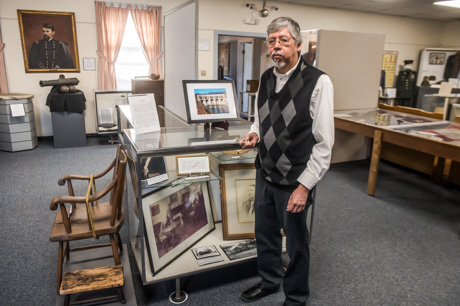Something you may not know about Jason Smith is that he didn’t aspire to be a school district superintendent.
In fact, his current role as head of Batavia City Schools just sort of happened with a suggestion that he should consider the next position, he says.
“The thing is there's nothing I've ever aspired to, it's kind of come to me, it's been a calling," Smith said during an interview with The Batavian. "When I was a teacher I never had any aspiration to be a superintendent. I was happy as a teacher. I was happy as an assistant principal. I was happy as a principal. I was happy as a superintendent in Lyndonville. I'm happy to be here."
His response was to one of several questions asked by The Batavian for an update on how his current role as Batavia City Schools superintendent has been going since he began Jan. 1 of this year. Smith has been a multi-district educator, going from Albion to Elba to Lyndonville, and now to Batavia.
Jack of all trades ...
He feels that he can connect with most anyone given his myriad of interests. The 50-year-old city resident plays the trombone, studies and snaps photos of birds, likes to run and participate in 5Ks, enjoys watching sports — he's a big Buffalo Bills fan — majored in history at college, and is a huge Bruce Springsteen and movie fan, especially Oscar winners.
It’s that kind of versatility that helps him to go from talking baseball and a budget to plumbing and roofing problems, he said. He has tried to finesse the art of knowing at least a little about a lot of various subjects, he said.
Jason Smith goes back to school ...
A 1990 Batavia High School graduate, Smith shared how he reminisced while walking down those Blue Devil hallways once again. He received a quick tour on his first official Monday, Jan. 3, and then did some reminiscing on a snow day later that week. He remembered classes, teachers — Mr. Trosey from English class and Mr. Hay from band -- and old friendships -- checked out the Athletic Hall of Fame and came upon fond memories.
"I walked through the hallways by myself and I tried to realign myself to the classes that I had. And as I was doing it, I was texting a couple of my friends I'm still friends with from high school, about the different spots I found. I found my old locker. I wanted to get reacclimatized to the school as a new student would,” he said. “That really wasn't my first memory because it was the first three days or so I was touring all the schools and meeting all the students and staff. And then I thought I had some time Thursday to kind of walk through very peacefully. And I just found it special for me to be back here in this capacity. I had time to kind of pause, you know, that the process of getting the job itself was very exciting. But then I had time to pause."
Smith picked up a glass crystal apple from the corner of his desk. Mr. Trosey had sent it to him following one of Smith’s opening day speeches that included credits to teachers, including Trosey, who had impacted his school career. It’s by far not alone in his collection of memorabilia. One tall bookshelf is full of notes from students and other school tidbits, plus, of course, his trombone, and there's a row of school programs that he has saved. "I'm very proud of those," he said.
Several minutes into the interview and the gloves came off: did you ever get into trouble at school Mr. Smith?
His initial answer was no, however, upon further reflection, Smith recalled when band teacher Mr. Hay “had to have a talk with me.”
“When I was a sophomore, I got my driver's license. And I was like the band treasurer or something. I was only 16 as a sophomore. So I had a car, and I was having fun driving students back and forth to home," he said. "And Mr. Hay had to pull me aside and have a talk with me: ‘Jason, I made you the treasurer for a reason. You've been unfocused.’ I'm sure that no, I didn't get in trouble. But I did have a couple of talks ensue from Mr. Hay.”
Smith often eats lunch with students and said that his old favorite was taco pizza and chocolate milk. “It still is,” he said, adding that chicken poppers and a frosted cookie for his sweet tooth also make the list. One thing you wouldn’t have found on his tray back then was broccoli, he admitted.
A little personal with professional ...
Smith has previously mentioned that he takes care of himself by getting “all of the proper components,” such as running four to five times a week, trying to watch what he eats, playing his trombone, enjoying movies, his family, the two dogs, and birds that frequent his back yard bird feeders. Family includes his wife Lori, daughter Megan, a 2020 BHS graduate, son Matthew, a BHS senior, and eighth-grade daughter Madeline. Megan may be following in dad’s footsteps by pursuing teaching at Niagara University, while Matthew wasn’t quite as excited to have his father at school as dad was, Smith said.
“I think it's fun. You know, he's enjoying his senior year. So I try to be respectful of that, but … the first day or so he wasn't so crazy about it," Smith said. "So as I said, ‘just embrace it. You know I'm here. Just in person.’”
Cooper, the family’s boxer lab mix, got a companion when the Smiths adopted Carol, a foxhound, in January. She was born in a litter named after The Brady Bunch sitcom characters, however, she was renamed from Marsha to Carol, because “we liked Carol better.”
“I enjoy walking and playing with them and try to have balance,” Smith said.
Part of his “entry process” as superintendent meant visiting with many people throughout the school district for a few months. He asked them to describe the school district in one word and found some of the answers a pleasant surprise. Words such as diversity, resilient, pride and supportive popped up.
Actually, there wasn’t really anything that surprised him as much as they “kind of also reaffirmed what I've already thought walking into the district.”
“They said things like pride, inclusive. I was proud to hear those words,” he said.
What's been the most challenging task since he started here? Being accessible to the 450 staff members and more than 2,000 students districtwide, he said.
“So a challenge I've had, and I’ve tried to overcome this by making myself accessible at games and concerts, was getting to know as many people as possible," he said. "And at smaller districts that were just as important to do. So I build time into going to as many things as I can.”
Does that ever get tiresome, having to attend so many public outings?
“It’s all I've known. It's just how I do business, you know? It's one of the pieces that people have in common as the board watches … they want to see visible superintendents in town. So it's not hard for me I don't find it challenging. I accepted it, and it's just part of my lifestyle now,” he said. “And I enjoy it. I'm going to the baseball game this afternoon. I tried to have a policy like this, as to what's going on, from pre-K all the way up to a senior baseball game.”
The public may not have connected a series of bird photos published on The Batavian as being from Jason Smith, superintendent of BCSD. His love of birds began with two parakeets he had as a kid. When he left as principal of Elba in 2011, Smith was given a bird feeder as a present because he had talked about birds. Smith now has some five bird feeders stationed at his southside home, he said. His grandfather loved birds and Smith has followed suit, to the point where he takes and submits photos consistently, compares notes about the feathered creatures with a neighbor, and generally enjoys watching them.
“It’s that moment of peace, I think,” he said.
Time to discuss the 2022-23 budget for a minute. The $54.8 million proposed budget includes an increase of $2.7 million in spending and a related 1 percent increase in the tax levy. Some social media posts have depicted voters as angry about the tax levy increase and have advocated a no vote on May 17. How do you reply to that?
“I want to say that this is not new territory for me. I recognize the challenges of building a school budget. I stand by my teeter-totter analogy and we want to have that piece there. So I would respond to that, we are conscientious of that, our board is very conscientious of that. But our board is also very conscientious of having to address the needs of our students, and ensuring we have staff and programs in place to support their needs. As I said at the board meeting last week, try to imagine a school without the (nonmandated programs). We don't have to have marching band, we don't have to have football. We want those things; those things are important.”
“So we have to balance those pieces out; it certainly ties into the social-emotional learning needs. So I would say it's a balancing act. And it's a partnership, and we recognize that. There's a task that was put in place for a reason. We recognize that, we respect that. We recognize the challenges that go into that. But we also have an obligation.”
I have neighbors that recognize the balance. And as a matter of fact, I had a conversation with one of my neighbors ... and she wanted to make sure we're still going to have good things for kids. So there's that side of it too. That's the teeter-totter," he said. "That's what I wrote in my newsletter. It's a balancing act and a partnership."
Looking ahead ...
What are your goals moving into 2023?
"We're going to announce a strategic plan in July. So Dr. Cory has been facilitating that process, we recommit the team, we're going to announce goals in June," he said. Each school is going to have its own goals that are aligned to pieces ... with respect to academic learning loss, social-emotional learning, and stronger professional collaboration with our teachers. We're forming shared decision-making teams at the building level ... So that's ongoing, I'm really excited about that, and really excited to have the opportunity to finish up this year. And then we're going to have some intense goal planning sessions this summer."
While Smith has always been proud of the district’s graduation rates — currently at 92 percent — he said there’s something equally important to leaving school with a diploma. He wants to know that students are going to look outside of themselves, be analytical thinkers and discerning readers that go beyond Facebook posts and article headlines before deciding on an issue.
"Two things that I want them to be able to do," he said. "Think critically and be good citizens."
Top photo: Batavia City Schools Superintendent Jason Smith shows some of the items he has collected and keeps in his office. Photo by Joanne Beck. Photo above was taken by Smith in his backyard.

















